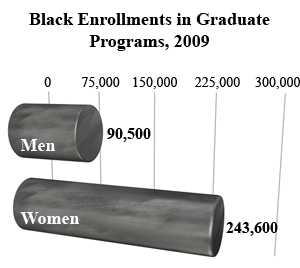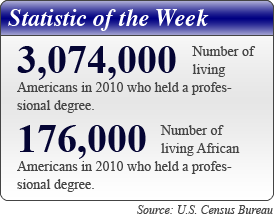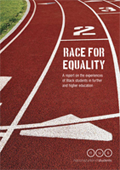The Huge African-American Gender Gap in Graduate Degree Programs
As reported in last week’s edition, new data from the U.S. Department of Education shows that in 2009, there were 342,400 African Americans enrolled in graduate programs in the United States.
But when broken down by gender, the enrollment statistics are shocking. There were 243,600 black women enrolled in graduate programs, compared to 90,500 black men. Thus, women accounted for a whopping 71.1 percent of all African-American graduate school enrollments.
For whites in 2009, women were 59.6 percent of total graduate school enrollments.
Ten years earlier in 2000, black women made up 67.5 percent of all African-American graduate enrollments. For whites the figures was 57.8 percent.

The New Dean of the Georgetown University Business School
 David A. Thomas was named dean of the McDonough School of Business at Georgetown University. His appointment is effective on August 1. Currently, he is the H. Naylor Fitzhugh Professor of Business Administration at Harvard Business School. He is also the director of the school’s Organizational Behavior Unit. He was previously a professor at the Wharton School of Finance at the University of Pennsylvania. He is the author of the award-winning book, Breaking Through: The Making of Minority Executives in Corporate America. David A. Thomas was named dean of the McDonough School of Business at Georgetown University. His appointment is effective on August 1. Currently, he is the H. Naylor Fitzhugh Professor of Business Administration at Harvard Business School. He is also the director of the school’s Organizational Behavior Unit. He was previously a professor at the Wharton School of Finance at the University of Pennsylvania. He is the author of the award-winning book, Breaking Through: The Making of Minority Executives in Corporate America.
Dr. Thomas holds bachelor’s, master’s and Ph.D. degrees from Yale University. He earned a second master’s degree in organizational psychology from Columbia University.
Black and Other Minority College Students in Texas Face a Steep Drop in Scholarship Aid
 A budget deal among legislators in Texas threatens the higher educational opportunities of tens of thousands low-income students. Many of these low-income students are African Americans or Latinos. A budget deal among legislators in Texas threatens the higher educational opportunities of tens of thousands low-income students. Many of these low-income students are African Americans or Latinos.
Under the proposed deal, scholarships for students at state-operated colleges and universities will be cut by 27 percent. As a result, over the next two years, the number of students who would receive scholarship aid from the state would drop from 153,738 to 112,680, a decrease of more than 41,000 students.
The TEXAS Grants Program, which is the state’s largest scholarship program and serves lower-income students, would provide scholarships for 33,000 first-year college students compared to 72,000 new recipients this year.
Grants to students at private colleges and universities would be cut by 8 percent and the number of students receiving scholarship assistance at the state’s community colleges would be reduced by 19 percent.
The budget deal actually is an improvement over an earlier proposal that would have eliminated some grant programs altogether.
Historically Black Virginia Union University Reinstates a Fine Arts Degree
 Virginia Union University, the historically black educational institution in Richmond, has announced that it will reinstate a bachelor of fine arts degree program. Students in the program will select a concentration of either visual arts, theater, or music but will be required to take courses in all three areas. Virginia Union University, the historically black educational institution in Richmond, has announced that it will reinstate a bachelor of fine arts degree program. Students in the program will select a concentration of either visual arts, theater, or music but will be required to take courses in all three areas.
The program, which will begin this fall, has four full-time faculty and several adjuncts.
The Higher Education of the Other Black Candidate for President
Everyone is well aware of the fact that Barack Obama is a graduate of Columbia University and Harvard Law School. But he is not the only African Americans in the 2012 race for the White House.
 Republican Herman Cain, who made a considerable sum by turning around Godfather’s Pizza, has tossed his hat into the ring. A fiscal and social conservative, Cain was born in Memphis but raised in Atlanta. He is a graduate of Morehouse College where he double majored in mathematics and physics. Cain earned a master’s degree at Purdue University. Republican Herman Cain, who made a considerable sum by turning around Godfather’s Pizza, has tossed his hat into the ring. A fiscal and social conservative, Cain was born in Memphis but raised in Atlanta. He is a graduate of Morehouse College where he double majored in mathematics and physics. Cain earned a master’s degree at Purdue University.
He served in the U.S. Navy and worked for Coca-Cola, Pillsbury, and Burger King, before becoming CEO Godfather’s Pizza. Cain is the author of several books including CEO of Self: You’re in Charge, Leadership Is Common Sense, and They Think You're Stupid: Why Democrats Lost Your Vote and What Republicans Must Do to Keep It.

The University of Cincinnati Reports Greater Diversity in Its Incoming Class
 The University of Cincinnati reports that its incoming class will be 10 percent larger this fall than it was a year ago. Preliminary data shows that black enrollments will be at least 7 percent higher than a year ago and that students who identify themselves as multiracial will increase by 26 percent. The University of Cincinnati reports that its incoming class will be 10 percent larger this fall than it was a year ago. Preliminary data shows that black enrollments will be at least 7 percent higher than a year ago and that students who identify themselves as multiracial will increase by 26 percent.
The latest data from the U.S. Department of Education shows that blacks are about 10 percent of the 22,000-member undergraduate student body at the university’s main campus.
Appointments, Promotions, and Resignations
 • Jane McBride Gates was appointed provost and vice president for academic affairs at Western Connecticut State University in Danbury. She will begin her new assignment on July 18. Currently, she is dean of the School of the College of Liberal Arts at Savannah State University in Georgia. • Jane McBride Gates was appointed provost and vice president for academic affairs at Western Connecticut State University in Danbury. She will begin her new assignment on July 18. Currently, she is dean of the School of the College of Liberal Arts at Savannah State University in Georgia.
Dr. Gates is a graduate of Arkansas State University. She holds a master of public administration degree from the University of Arkansas and a Ph.D. in political science from Southern Illinois University.
 • Renee T. White was named dean of the School of Arts and Sciences at Simmons College in Boston. Her appointment takes effect on September 1. She has been serving as a professor of sociology and black studies at Fairfield University in Connecticut. • Renee T. White was named dean of the School of Arts and Sciences at Simmons College in Boston. Her appointment takes effect on September 1. She has been serving as a professor of sociology and black studies at Fairfield University in Connecticut.
Dr. White is a graduate of Brown University. She holds a master’s degree and a Ph.D. in sociology from Yale University.
 • Hazel M. McFerson was promoted from associate to full professor in the department of public and international affairs at George Mason University in Fairfax, Virginia. • Hazel M. McFerson was promoted from associate to full professor in the department of public and international affairs at George Mason University in Fairfax, Virginia.
A former Fulbright Scholar in the Philippines, Dr. McFerson is a graduate of the University of Massachusetts at Boston. She holds a master’s degree from the Fletcher School of International Law and Diplomacy at Tufts University and a Ph.D. in political science from Brandeis University.
 • Chippewa Thomas, an associate professor in the College of Education at Auburn University in Alabama, was named director of faculty engagement in the university’s Office of the Vice President for University Outreach. Dr. Thomas has been on the Auburn faculty since 2005. • Chippewa Thomas, an associate professor in the College of Education at Auburn University in Alabama, was named director of faculty engagement in the university’s Office of the Vice President for University Outreach. Dr. Thomas has been on the Auburn faculty since 2005.
Dr. Thomas is a graduate of Tuskegee University. She holds a master’s degree and an educational doctorate from Auburn University.
 • Mandy Santiago was named director of development at Cheyney University, the historically black educational institution in Pennsylvania. She was a fundraising officer for the Crozer-Keystone Health System. • Mandy Santiago was named director of development at Cheyney University, the historically black educational institution in Pennsylvania. She was a fundraising officer for the Crozer-Keystone Health System.
Santiago is a graduate of Skidmore College and holds a master of social service degree from Bryn Mawr College.
 • Robin N. Coger is the new dean of the College of Engineering at North Carolina A&T State University in Greensboro. She has been serving as a professor of mechanical engineering and director of the Center for Biomedical Engineering Systems at the University of North Carolina at Charlotte. • Robin N. Coger is the new dean of the College of Engineering at North Carolina A&T State University in Greensboro. She has been serving as a professor of mechanical engineering and director of the Center for Biomedical Engineering Systems at the University of North Carolina at Charlotte.
Dr. Coger is a graduate of Cornell University. She earned a master’s degree and a Ph.D. in mechanical engineering at the University of California at Berkeley.
 • Darrell Wheeler was named dean of the School of Social Work at Loyola University in Chicago. He was associate dean for research and community partnerships at the Hunter College School of Social Work in New York City. • Darrell Wheeler was named dean of the School of Social Work at Loyola University in Chicago. He was associate dean for research and community partnerships at the Hunter College School of Social Work in New York City.
Dr. Wheeler is a graduate of Cornell College. He earned a master of social work degree at Howard University and a Ph.D. and a master of public health degree at the University of Pittsburgh.
|
Assessing Racism on British University Campuses
The National Union of Students (NUS) in the United Kingdom has released a new report that shows that many black students at Britain’s elite universities feel isolated on campus.
 The NUS surveyed 900 minority students. About a quarter of the minority students said their universities were “cliquey.” Another 7 percent said their educational institutions were downright racist. About 16 percent of the surveyed students said they had personally experienced racism on campus. Nearly 30 percent of minority university students over the age of 40 said they had been confronted with racism on campus. The NUS surveyed 900 minority students. About a quarter of the minority students said their universities were “cliquey.” Another 7 percent said their educational institutions were downright racist. About 16 percent of the surveyed students said they had personally experienced racism on campus. Nearly 30 percent of minority university students over the age of 40 said they had been confronted with racism on campus.
In the report, entitled Race for Equality, the NUS calls for universities to minimize the Eurocentric curriculum found at many institutions. The report also suggests that universities devise a system where students’ exams and papers can be read and graded anonymously so that any potential bias can be eliminated.

Dillard University Names an Experienced Leader as Interim President
 James Lyons has agreed to serve as interim president of Dillard University when Marvalene Hughes steps down at the end of the month. Dr. Lyons, a member of the Dillard board of trustees, has previously served as president of California State University at Dominguez Hills, Jackson State University in Mississippi, and Bowie State University in Maryland. He will serve as president until a permanent successor to Dr. Hughes is found. The university stated that Dr. Lyons could serve as interim president for a year. James Lyons has agreed to serve as interim president of Dillard University when Marvalene Hughes steps down at the end of the month. Dr. Lyons, a member of the Dillard board of trustees, has previously served as president of California State University at Dominguez Hills, Jackson State University in Mississippi, and Bowie State University in Maryland. He will serve as president until a permanent successor to Dr. Hughes is found. The university stated that Dr. Lyons could serve as interim president for a year.
President Lyons is a native of New Haven, Connecticut. He holds bachelor’s, master’s and doctoral degrees from the University of Connecticut.
Black Colleges Bear the Brunt of the NCAA’s APR Penalties
 Recently the National Collegiate Athletic Association announced penalties for colleges and universities that had poor records in achieving academic success for their student athletes. The APR scores measure academic progress towards a degree, retention of student athletes, and the graduation rate of student athletes. Recently the National Collegiate Athletic Association announced penalties for colleges and universities that had poor records in achieving academic success for their student athletes. The APR scores measure academic progress towards a degree, retention of student athletes, and the graduation rate of student athletes.
This year, 33 of the 103 institutions that received some form of sanctions from the NCAA were historically black colleges and universities. Half of the 58 schools that received the most severe penalties, including loss of athletics scholarships, were HBCUs. Of all schools assessed for the APR report, only 7 percent are HBCUs.
At Howard University alone, there were eight teams that scored below the minimum APR score. Both the football team and the women’s lacrosse team were assessed penalties in the form of reduced scholarships.
The NCAA’s Committee on Academic Performance is in the process of reviewing the APR assessment and penalties. They have indicated that they will address the fact that the system has a severe negative impact on black colleges and universities.
Winner of the National Book Award from the Benjamin L. Hooks Institute
 The Benjamin L. Hooks Institute for Social Change has announced the winner of its National Book Award for 2010. The award is given to the book published in 2010 that “best furthered the understanding of the American civil rights movement.” The Benjamin L. Hooks Institute for Social Change has announced the winner of its National Book Award for 2010. The award is given to the book published in 2010 that “best furthered the understanding of the American civil rights movement.”
The winning book is Hands on the Freedom Plow: Personal Accounts by Women in the SNCC. The book, published by the University of Illinois Press, was edited by a group of former members of the Student Nonviolent Coordinating Committee.
Survey Finds Lower Incidence of Sexual Assault at HBCUs Compared to Predominantly White Colleges and Universities
New research, published in the Journal of Interpersonal Violence by scholars at the University of North Carolina, North Carolina Central University, and Florida A&M University, finds that just under 10 percent of all women enrolled in black colleges and universities reported being a victim of a sexual assault during their college years. For women at predominantly white universities, 13.7 percent reported being a victim of sexual assault.
The authors surveyed nearly 4,000 women at black colleges and universities and more than 5,400 women at predominantly white institutions. The researchers concluded that the lower incidence of alcohol abuse at HBCUs was a major factor in the lower rate of sexual assault on these campuses.
Recent Books That May Be of Interest to African-American Scholars
 The JBHE Weekly Bulletin regularly publishes a list of new books that may be of interest to our readers. Here are the latest selections. The JBHE Weekly Bulletin regularly publishes a list of new books that may be of interest to our readers. Here are the latest selections.
• Afro-Pentecostalism: Black Pentecostal and Charismatic Christianity in History and Culture edited by Amos Young and Estrelda Y. Alexander (New York University Press)
• Baltimore ‘68: Riots and Rebirth in an American City edited by Jessica Elfenbein et al. (Temple University Press)
• Beyond Blackface: African Americans and the Creation of American Popular Culture, 1890-1930 by W. Fitzhugh Brundage (University of North Carolina Press)
• Black Woman Redefined: Dispelling Myths and Discovering Fulfillment in the Age of Michelle Obama by Sophia Nelson (BenBella Books)
• Collective Terms: Race, Culture, and Community in a State-Planned City in France by Beth S. Epstein (Berghahn Books)
• Hip Hop’s Inheritance: From the Harlem Renaissance to the Hip Hop Feminist Movement by Reiland Rabaka (Lexington Books)
• Knowing Otherwise: Race, Gender, and Implicit Understanding by Alexis Shotwell (Pennsylvania State University Press)
• Race and Economics: How Much Can Be Blamed on Discrimination? by Walter E. Williams (Hoover Institution Press)
• Slave Narratives After Slavery edited by William L. Andrews (Oxford University Press)
• Slavery, Disease, and Suffering in the Southern Lowcountry by Peter McCandless (Cambridge University Press)
• Specters of Democracy: Blackness and the Aesthetics of Politics in the Antebellum U.S. by Ivy G. Wilson (Oxford University Press)
• The African American Odyssey of John Kizell: The Life and Times of a South Carolina Slave Who Returned to Fight the Slave Trade in His African Homeland by Kevin G. Lowther (University of South Carolina Press)
• The American Dreams of John B. Prentis, Slave Trader by Kari J. Winter (University of Georgia Press)
• The Color of Justice: Race, Ethnicity, and Crime in America by Samuel Walker et al. (Wadsworth Publishing)
• Urban Design, Chaos, and Colonial Power in Zanzibar by William C. Bissell (Indiana University Press)
Honors and Awards
 • Ruth J. Simmons, president of Brown University in Providence, Rhode Island, received the Susan Colver Rosenberger Medal, the highest honor bestowed by the university’s faculty. The medal, presented for the first time in 1925, honors Dr. Simmons on her tenth anniversary as Brown’s president. • Ruth J. Simmons, president of Brown University in Providence, Rhode Island, received the Susan Colver Rosenberger Medal, the highest honor bestowed by the university’s faculty. The medal, presented for the first time in 1925, honors Dr. Simmons on her tenth anniversary as Brown’s president.
Dr. Simmons is a graduate of Dillard University in New Orleans and holds a Ph.D. in Romance languages and literatures from Harvard University.
 • J. Nicole Shelton, an associate professor of psychology at Princeton University, received the Graduate Mentoring Award from the McGraw Center for Teaching and Learning at the university. • J. Nicole Shelton, an associate professor of psychology at Princeton University, received the Graduate Mentoring Award from the McGraw Center for Teaching and Learning at the university.
Dr. Shelton is a graduate of the College of William and Mary. She holds a master’s degree and a Ph.D. in psychology from the University of Virginia.
Grants and Gifts
• The Medical College of Wisconsin received a five-year, $5.9 million grant from the National Institutes of Health to develop new HIV prevention programs for African-American men who have sex with men.
 • The University of California at Riverside received a $156,417 grant from the state university system for a program aiming to increase the number of African-American students in the university’s graduate programs. For the next three summers, six students from historically black colleges and universities will spend eight weeks on campus gaining graduate research experience. They will be mentored by UC Riverside faculty. Participants will receive travel expenses, room and board, and a $3,000 stipend. • The University of California at Riverside received a $156,417 grant from the state university system for a program aiming to increase the number of African-American students in the university’s graduate programs. For the next three summers, six students from historically black colleges and universities will spend eight weeks on campus gaining graduate research experience. They will be mentored by UC Riverside faculty. Participants will receive travel expenses, room and board, and a $3,000 stipend.
The grant program is under the direction of assistant professor Erica Edwards (above), who holds a Ph.D. from Duke University.
 • Morgan State University, the historically black educational institution in Baltimore, received a $520,497 research grant from the U.S. Department of Defense. The research, under the direction of Angela Winstead, an associate professor of chemistry at the university, will seek to develop sensitive probes that troops can use for pathogen detection. • Morgan State University, the historically black educational institution in Baltimore, received a $520,497 research grant from the U.S. Department of Defense. The research, under the direction of Angela Winstead, an associate professor of chemistry at the university, will seek to develop sensitive probes that troops can use for pathogen detection.
• The University of Southern California received a five-year, $1.8 million grant from the Minority Business Development Agency of the U.S. Department of Commerce. The grant will support the university’s Minority Business Development Agency Business Center on campus. The center offers business consulting services to minority entrepreneurs in Los Angeles.
• Medgar Evers College in Brooklyn, New York, received a three-year, $450,000 grant from the New York State Department of Education. The grant will support the dual enrollment program of the college and the Medgar Evers College Preparatory High School.
About 86 percent of the students at the college, part of the City University of New York system, are black.
• The historically black University of Maryland Eastern Shore received a grant from the U.S. Department of Education to fund the Foreign Language Instructional Center on campus. Previously, the university offered foreign language programs only in French and Spanish. But the new center will teach classes in Arabic, Chinese, and Haitian Creole. In the future, the center hopes to add studies in Russian, Hindi, Swahili, and several other African languages. |
 .
.